Related Research Articles
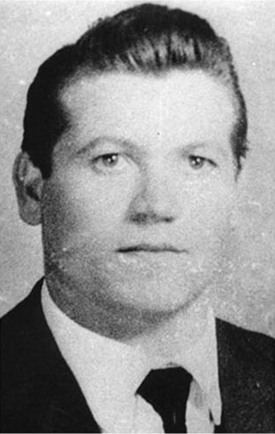
Bernardo Provenzano was an Italian mobster and chief of the Sicilian Mafia clan known as the Corleonesi, a Mafia faction that originated in the town of Corleone, and de facto the boss of bosses. His nickname was Binnu u tratturi because, in the words of one informant, "he mows people down". Another nickname was il ragioniere, due to his apparently subtle and low-key approach to running his crime empire, at least in contrast to some of his more violent predecessors.
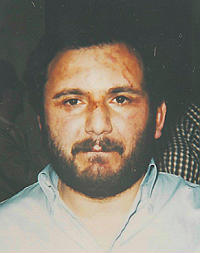
Giovanni Brusca is an Italian mobster and former member of the Corleonesi clan of the Sicilian Mafia. He played a major role in the 1992 murders of Antimafia Commission prosecutor Giovanni Falcone and businessman Ignazio Salvo, and once stated that he had committed between 100 and 200 murders. Brusca had been sentenced to life imprisonment in absentia for Mafia association and multiple murder. He was captured in 1996, turned pentito and his sentence reduced to twenty-six years in prison. In 2021, Brusca was released from prison.

Salvatore Achille Ettore Lima, often referred to as Salvo Lima, was an Italian politician from Sicily who was associated with, and murdered by, the Sicilian Mafia. According to the pentito Tommaso Buscetta, Lima's father, Vincenzo Lima, was a member of the Mafia but is not known whether Lima himself was a made member of Cosa Nostra. In the final report of the first Antimafia Commission (1963–1976), Lima was described as one of the pillars of Mafia power in Palermo.
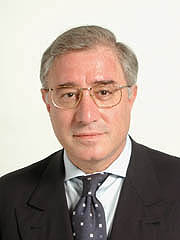
Marcello Dell'Utri is a former Italian politician. He is best known for being a senior advisor to former prime minister Silvio Berlusconi, of whom he became a secretary in his early 20s and since the 1970s had worked for him at his many companies, including Publitalia '80 and Fininvest Rai. Dell'Utri's life and career have been marred by controversies and legal issues, including a conviction for external complicity in mafia association.

Leoluca Bagarella is an Italian criminal and member of the Sicilian Mafia. He is from the town of Corleone. Following Salvatore Riina's arrest in early 1993, Bagarella became the head of the stragist strategy faction, opposing another faction commanded by the successor designate Bernardo Provenzano, creating a real rift in Cosa Nostra. Bagarella was captured in 1995, having been a fugitive for four years, and sentenced to life imprisonment for Mafia association and multiple murders.

Giuseppe "Pippo" Calò is an Italian mobster and member of the Sicilian Mafia in Porta Nuova. He was referred to as the cassiere di Cosa Nostra because he was heavily involved in the financial side of organized crime, primarily money laundering. He was arrested in 1985 and sentenced to 23 years' imprisonment as part of the 1986/87 Maxi Trial. He was sentenced to life imprisonment in 1989 for organising the 1984 Train 904 bombing and was given several further life sentences between 1995 and 2002. He was also charged with ordering the murder of Roberto Calvi – nicknamed il banchiere di Dio – of the Banco Ambrosiano in 1982, but was acquitted in 2007 due to "insufficient evidence" in a surprise verdict.

Salvatore Lo Piccolo, also known as "the Baron", is a Sicilian mafioso and one of the most powerful bosses of Palermo, Sicily. Lo Piccolo rose through the ranks of the Palermo mafia throughout the 1980s and he became the capomandamento of the San Lorenzo district in 1993, replacing Salvatore Biondino, who was sent to prison. Lo Piccolo was a fugitive since 1983 and had been running his Mafia affairs in hiding. With the capture of Bernardo Provenzano on 11 April 2006, Lo Piccolo had been cementing his power and rise to the top of the Palermo Mafia until his own arrest on 5 November 2007. It is believed that his family spread across Europe due to rising tensions, settling in England, Portugal, and southern Spain.

Giuseppe Graviano is an Italian mafioso from the Brancaccio quarter in Palermo. He also was one the men of the death squad that murdered Salvatore Contorno's relatives. He is currently serving several life sentences. He and his three siblings became members of the Sicilian Mafia Commission for the Brancaccio-Ciaculli mandamento, substituting Giuseppe Lucchese who was in prison.

Salvatore "Vito" Vitale, also known as Fardazza, is a member of the Sicilian Mafia. For a while he was considered the heir of Totò Riina and was closely connected to Leoluca Bagarella.

Mauro De Mauro was an Italian investigative journalist. Originally a supporter of Benito Mussolini's Fascist regime, De Mauro eventually became a journalist with the left-leaning newspaper L'Ora in Palermo. He disappeared in September 1970 and his body has never been found. The disappearance and probable death of the "inconvenient journalist", as he became known as a result of his investigative reporting, remains one of the greatest unsolved mysteries in modern Italian history.
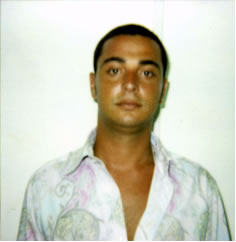
Giovanni "Gianni" Nicchi is a member of the Sicilian Mafia. Despite his young age – he is nicknamed 'u picciutteddu – he is considered to be one of the leading mafiosi of Cosa Nostra in Palermo. He was on the "most wanted list" of the Italian ministry of the Interior since 2006, until his arrest on 5 December 2009.
Pietro Tagliavia is a member of the Sicilian Mafia. Despite his young age, he is considered to be one of the upcoming leading Mafiosi of Cosa Nostra in Palermo.

Gaetano Fidanzati was a Sicilian Mafia boss of the Resuttana mandamento in Palermo and heavily involved in drug trafficking. He was among the first Mafia bosses to establish a presence in Northern Italy, in particular Milan, and was the protagonist of the alliances between the Sicilian Cosa Nostra, the American Cosa Nostra, the Neapolitan Camorra and the Colombian drug cartels.
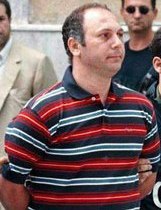
Gaspare Spatuzza is a Sicilian mafioso from the Brancaccio quarter in Palermo. He was an assassin for the brothers Filippo and Giuseppe Graviano who headed the Mafia family of Brancaccio. After the arrest of the Gravianos in January 1994, he apparently succeeded them as the regent of the Mafia family. He was arrested in 1997 and started to cooperate with the judicial authorities in 2008. In his testimony, he stated that media tycoon and then prime minister Silvio Berlusconi made a deal with the Sicilian Mafia in 1993 that put the country in the hands of Cosa Nostra.

Salvatore Riina, called Totò, was an Italian mobster and chief of the Sicilian Mafia, known for a ruthless murder campaign that reached a peak in the early 1990s with the assassinations of Antimafia Commission prosecutors Giovanni Falcone and Paolo Borsellino, resulting in widespread public outcry, legal change and a major crackdown by the authorities. He was also known by the nicknames la belva and il capo dei capi.
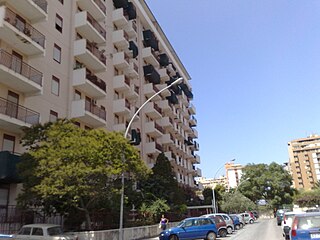
The via D'Amelio bombing was a terrorist attack by the Sicilian Mafia, which took place in Palermo, Sicily, Italy, on 19 July 1992. It killed Paolo Borsellino, the anti-Mafia Italian magistrate, and five members of his police escort: Agostino Catalano, Emanuela Loi, Vincenzo Li Muli, Walter Eddie Cosina, and Claudio Traina.
Rocco Morabito is an Italian criminal and a member of the 'Ndrangheta, a Mafia-type organisation in Calabria. Before being arrested in Uruguay on 4 September 2017, he had been a fugitive since 1994 being wanted for drug trafficking, Mafia association and other serious crimes. In June 2019, Morabito escaped from prison, and was arrested again in Brazil in May 2021.
The term State-Mafia Pact describes an alleged series of negotiations between important Italian government officials and Cosa Nostra members that began after the period of the 1992 and 1993 terror attacks by the Sicilian Mafia with the aim to reach a deal to stop the attacks; according to other sources and hypotheses, it began even earlier. In summary, the supposed cornerstone of the deal was an end to "the Massacre Season" in return for a reduction in the detention measures provided for Italy's Article 41-bis prison regime. 41-bis was the law by which the Antimafia pool led by Giovanni Falcone had condemned hundreds of mafia members to the "hard prison regime". The negotiation hypothesis has been the subject of long investigations, both by the courts and in the media. In 2021, the Court of Appeal of Palermo acquitted a close associate of former prime minister Silvio Berlusconi, while upholding the sentences of the mafia bosses. This ruling was confirmed by the Italian Supreme Court of Cassation in 2023.
The Graviano family is a Sicilian Mafia clan, composed of four mafioso siblings: Benedetto, Filippo, Giuseppe and Nunzia. Their father was Michele Graviano, uomo d'onore that belonged to the Brancaccio Mafia family and was murdered by Gaetano Grado in 1982.
References
- ↑ From papýrus in Latin and πάπυρος (pàpyros) in Ancient Greek, from which derive modern terms paper, papier (French) and papel (Spanish and Portuguese).
- ↑ (in Italian) Papellu, quoted by Vincenzo Consolo in La parola. Corriere della sera. Archivio storico. 20 luglio 2009.
- ↑ "Stato-mafia, ecco il papello". L'Espresso (in Italian). 15 October 2009. Archived from the original on 1 September 2010.
- ↑ "Ecco il papello". Corriere della Sera (in Italian). 16 October 2009.